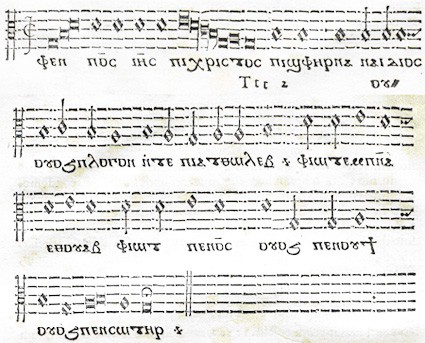This is the second of five winning entries from our recent blog contest. The category for this post is “Tell Your Story”. The other winning entries will be posted over the next two weeks, followed by entries receiving honorable mention.
I was born to Coptic parents who moved to America from Egypt because of the increasing persecution against Christians.
Growing up, my family’s main social sphere was encompassed by the Coptic Orthodox church we attended. From a young age, I considered this place my home. I loved the calm presence, the smell of incense, the books, and the solemnity of the rituals. But above all, I was mesmerized by the chanting. If you’ve ever been to a Coptic church (or any Orthodox church) you’re sure to notice that the music is not like any mainstream American Christian experience. I loved to learn the hymns, and I was good at it. While most of my friends were too overwhelmed by the complexity of the tunes and the difficulty of reading and speaking in Coptic, chanting felt like the most natural place in the church for me.
Knocking on doors closed to women
But as I tried to learn and grow in my passion, I found doors closed to me everywhere I turned. As a girl, I was not allowed to be a chanter in church, and in many cases I was discouraged from simply learning the chants. All areas of public leadership, teaching, and singing are closed to women in the Coptic Orthodox church. I was devastated by this exclusion. As I grew older, it broke my heart to see my church home as a place of institutionalized sexism. The only word that really describes it is grief. I couldn’t believe that a community I held so dear treated women in ways that were so far from the values of the gospel. During my first year of college, I swore I would do everything in my power to change that. Since then, I have poured my energy into that goal.
 I work with a small group of women at my church who are interested in chanting to educate, challenge, and encourage them. We fought for our right as women to participate in chanting in church services, and we have become a model for other Coptic churches in the Los Angeles area who want to begin providing liturgical roles for women in their services. This group has become a forum through which we have advocated for the right of women to have a voice in our community.
I work with a small group of women at my church who are interested in chanting to educate, challenge, and encourage them. We fought for our right as women to participate in chanting in church services, and we have become a model for other Coptic churches in the Los Angeles area who want to begin providing liturgical roles for women in their services. This group has become a forum through which we have advocated for the right of women to have a voice in our community.
For the last ten years I have worked with this group as a mentor and teacher to train female leaders in the church for more participation in church leadership. Leading this advocacy group has been one of the biggest joys of my life, and with every small victory I am given a new sense of purpose in my community.
Navigating the politics of social justice
Around the same time I established the women’s group at church, I began teaching high school math at Locke High School in South Central Los Angeles. When I became a teacher, I had a feminist Christian agenda: moving against a culture of domination for the sake of the gospel. That was my goal as I began working in this severely underserved community. I wanted to educate youth of color so that they could empower others and have the knowledge and confidence they need to break the cycles of crime and ignorance that are considered normal in their community.
Teaching in South Central has opened my eyes to the politics of social justice and activism. Often times, making decisions about what is best for my students is not as straightforward as it seems. There are underlying structures and bureaucracies that make this difficult and often seem as though they were implemented with the specific goal of marginalization. Navigating through this mess has lent clarity to my priorities and has given me the courage to make meaningful changes to benefit my students.
Resourcing women of color
These two experiences have taught me how to be a resource to women of color in a variety of communities. At first glance, Copts in the California suburbs may not appear to have much in common with Black and Latino youth in South Central. But I have seen that they are more alike than one may think. These two communities are in desperate need of healing from the injustices that they have suffered, both from outside forces and from internal structural flaws. I decided a long time ago that even though I feel marginalized as a woman in my community, I have to be solution oriented. As long as I can work for change, I can stay and I must stay.





9 responses to “Chanting for Change in the Coptic Church”
This is nice to read.
Having converted at St John only a few years ago I came in with Mariam leading the fenale chanters.
When I was conscripted to teach for a time Mariam was my boss.
I just kinda took for granted these things and ha no idea how recently they had been different. And how much she has achieved.
…and she has always scared me.
: )
Mariam, thanks for this reminder that as long as there is a chance we can make an impact, it’s worth staying. It is all too easy to give up! The only thing that would make this post better would be an audio or video of your group of women chanting 🙂
Thanks for reminding us all to be “solution oriented!” As long as we can all work for change, we must stay and we must stay! I love your wisdom! God’s peace and chanting beside you Mariam.
As a fellow Orthodox Christian, I am proud of your dedication both to your Church and to your wider community. There is nothing more important to our country than a good education for all its youth. Isaiah 40:30-31
Mariam, how encouraging to read yet another woman working to Educate, Advocate and Agitate if necessary for women’s basic human right in the church and society. Here is information on how you may meet others with like mind, vision, and mission.
http://www.womenofcolorinministry.org/
Mariam, thank you for paying attention to what God put in your heart at a very young age. Your example, courage and advocacy is paving the way for many young women and is an inspiration to those of us who are older. Thank you for “staying.”